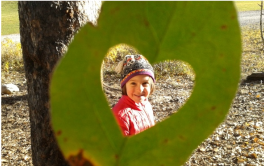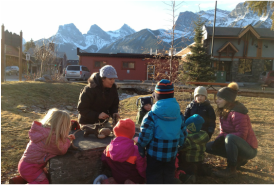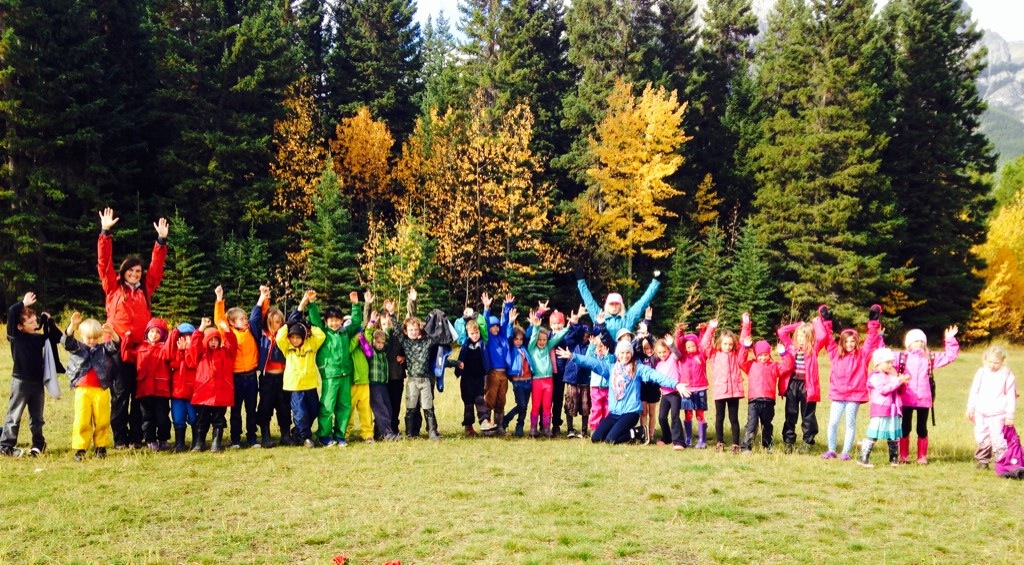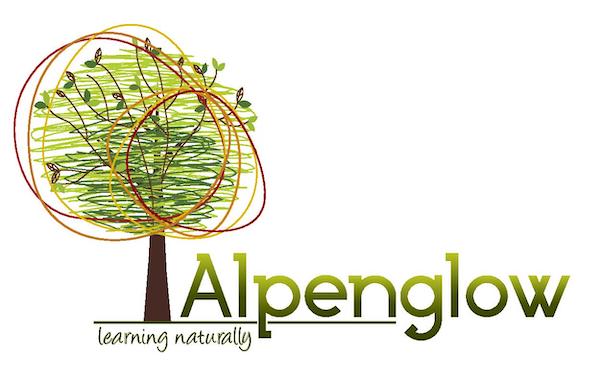Alpenglow School
You may find yourself asking...
What makes Alpenglow School unique as an alternative CRPS program?
Alpenglow School is a unique blending of Waldorf teaching practices, nature immersion and the AB curriculum. It has a structured and balanced curriculum which is designed to educate “the whole child” nurturing their heart, head and hands. As a multi-disciplinary approach, nature education, experiential learning and artistic expression are integrated to create learning experiences in which the children can truly know and understand a concept as they have experienced it in many ways including physically, emotionally and intellectually. The school focuses on developing the students’ capacity for learning and processing. Testing and exams are de-emphasized and are typically not used to measure the success of the students. Daily class observations, conversations with the children and parents, and reflection of the students’ academic, emotional and social development are used to assess the students’ growth and success.
What is the curriculum like in the Alpenglow Kindergarten-Grades School?
Alpenglow School is an alternative program of the Canadian Rockies Public Schools (CRPS) and teaches the AB curriculum. The Alpenglow Kindergarten began September 2012. Its goal is to develop a sense of wonder and imagination, and the children learn primarily through play and imitation. Kindergarten activities include: storytelling, creative free play, playing inside and outside, singing, painting, beeswax modelling, baking, games, outdoor immersion, seasonal celebrations and festivals.
The Grades 1-4 of the Alpenglow School began September 2013, and the first Grade 5 class was welcomed September 2014, followed by the first Grade 6 class in September 2015. Academics are first introduced in Grade 1. In the Grades, the goal is to create a genuine inner enthusiasm for learning and respect for the environment, community and self. The teacher guides the children through the curriculum using an integrated, multidisciplinary approach. The academics are supported through an immersion in nature, experiential learning (doing and moving), and artistic expressions to gain an appreciation and understanding of the topics. The core subjects, Language Arts, Mathematics, Science and Social Studies, are taught in main lesson blocks of 1.5- 2 hours daily in 3-5 week cycles. The topics are often integrated and main lesson blocks are enriched with nature integration, storytelling, artistic mediums and handwork.
The Grades 1-4 of the Alpenglow School began September 2013, and the first Grade 5 class was welcomed September 2014, followed by the first Grade 6 class in September 2015. Academics are first introduced in Grade 1. In the Grades, the goal is to create a genuine inner enthusiasm for learning and respect for the environment, community and self. The teacher guides the children through the curriculum using an integrated, multidisciplinary approach. The academics are supported through an immersion in nature, experiential learning (doing and moving), and artistic expressions to gain an appreciation and understanding of the topics. The core subjects, Language Arts, Mathematics, Science and Social Studies, are taught in main lesson blocks of 1.5- 2 hours daily in 3-5 week cycles. The topics are often integrated and main lesson blocks are enriched with nature integration, storytelling, artistic mediums and handwork.
What is nature immersion and nature integration?
Nature integration is when class subjects are integrated into an outdoor learning space. What can be learned inside can often very easily be taught or supported outside, such as animal habitats, plants, local environment, patterns, symmetry. Nature can also bring inspiration and ideas for artistic expression, story writing, poetry and descriptive writing.
Nature immersion is time spent in the outdoors absorbing the beauty of all that surrounds us. It gives the students time to thoroughly absorb and integrate some of the day’s lessons, opportunity to quieten their minds, relieve stress, be inspired by nature, and move freely.
Nature immersion is time spent in the outdoors absorbing the beauty of all that surrounds us. It gives the students time to thoroughly absorb and integrate some of the day’s lessons, opportunity to quieten their minds, relieve stress, be inspired by nature, and move freely.
How much time is spent outside?
All the Alpenglow students start their morning with a walk outside to allow them time to adjust from their morning home routine, join together as class with their teacher, and focus on their class day ahead. There is a morning recess and lunchtime recess daily. Students will eat their lunches outside during the Fall and Spring.
|
Learning and being outside in nature is a key element of the program, and teachers plan their lessons to be taught outside and with examples of nature as much as possible, as long as there are logical, appropriate and natural connections. In addition to play time outside, music, dance and yoga are often done outside. There is not a specific amount of time that the students must be outside each day or week, but it is often at least for an additional academic hour per day.
|
Each week there is a day or half-day that is usually activity based. These hours are classroom specific and/or school wide and usually spent outdoors with a focus on nature immersion, nature science and/or physical education. Students may work in community garden, do a nature hike at Grassi Lakes, go skiing or climbing together. The students may be grouped in mixed-age and grade groups, or in grade specific groups depending on the activity and content.
|
In addition to the AB curriculum, are the students being taught other subjects?
Yes. The children are spending time in nature on a daily basis. There is a gardening program that spans the Fall, Winter and Spring. They learn form drawing, a practice unique to Waldorf education which introduces basics line and curve repetitions to support letter and number formation, drawing skills and geometric designs. The students do also handwork, such as knitting and woodworking to support their fine motor and handwork skills.
The Alpenglow students regularly meet with their high school buddies, and have developed a fun and supportive relationship together. The CCHS students are positive mentors to the Alpenglow students, and support them as reading buddies, playing cooperative games together and doing grade related projects together. The high school students have also organized special events for the Alpenglow students such as the Winter Carnival and plays.
The Alpenglow students regularly meet with their high school buddies, and have developed a fun and supportive relationship together. The CCHS students are positive mentors to the Alpenglow students, and support them as reading buddies, playing cooperative games together and doing grade related projects together. The high school students have also organized special events for the Alpenglow students such as the Winter Carnival and plays.
What happens after the students have completed Grade 6? Where do they go and how will they be transitioned into a different learning system?
The Grade 6 students will be transferred into the Grade 7 English program at Lawrence Grassi Middle School. Before the end of Grade 6, the class teacher will work with his/her students and current grade 7 CRPS teachers to help prepare the students to transition into this program.
Are languages taught in the Grades?
Yes. French is taught twice a week starting in Grade 1. The Alpenglow School is not a French immersion program, but will help the students to gain ‘an ear’ for the language. French vocabulary is taught, for example, through songs, rhymes and games.
What forms of music are taught?
All the Grades students learn the recorder and have music class twice a week. Each teacher may also bring in other musical experiences for the students. Singing and playing of the guitar are also regular forms of musical experiences for the students at Alpenglow.
Is there homework?
No. Parents are encouraged to provide learning opportunities with their children at home in ways that align with the school program. If a student requires extra academic support, teachers will work with the parents to decide ideas and options for parental home support or additional tutoring.
When do children learn to read at Alpenglow School?
The Reading and Writing process is strongly supported through oral literacy and rich storytelling, acting out plays, singing and learning rhymes in Kindergarten. It is not until Grade 1 that the children learn to write and read when it is introduced slowly and methodically.
Will computers and electronics be used at the Alpenglow School?
No, students are encouraged to create their own images and ideas, and experience topics directly as much as possible. In our Grade 6 classes, computers are introduced to assist students in their transition to Grade 7. Computer and media use as a tool for further developing their creativity, communication and academic skills will be introduced more fully in the higher grades.
Will families be expected to limit computers, television and other media use at home?
Research does support limiting and carefully monitoring content for age-appropriateness. It is recommended that families consider what types of media use and content exposure best support their family values and beliefs. Each family must decide what works best for their own family.
Does a classroom teacher follow a class from Grade 1 on wards?
At the Alpenglow School, a classroom teacher may follow the same class for multiple years to help create a secure long-term relationship between teacher and child, which will greatly support the child in his/her learning process. A close learning community is created in which the children really get to know each other well, and learn to work through challenges together.
As the Alpenglow School has introduced multiple grades in blended classes, we cannot guarantee at this time that the same teacher will follow the same class for multiple years. However, we are committed to meet the students where they are at, and create the most supportive, consistent and caring learning environment possible for them.
As the Alpenglow School has introduced multiple grades in blended classes, we cannot guarantee at this time that the same teacher will follow the same class for multiple years. However, we are committed to meet the students where they are at, and create the most supportive, consistent and caring learning environment possible for them.
Is the Alpenglow School religious?
The Alpenglow School is non-denominational and non-sectarian. It is not affiliated with any church or religious. Our pedagogy is based on a belief that there is a spiritual dimension to the human being. Festivals are celebrated throughout the year that recognize seasonal changes. Gratitude is shared and appreciation of nature is acknowledged through giving thanks and blessings. All children and families are welcome to join the school.
What qualifications do your teachers have?
All Alpenglow teachers meet Alberta Certification requirements with a Bachelor of Education, and will train in Waldorf and nature education practices at one of the appointed colleges in North America. In addition to their university training, the Alpenglow teachers receive regular mentoring and summer training. These professional development opportunities are supported by Alpenglow Community Education Society (ACES) and a portion of the program fees.
How much will it cost? Why is there an additional program fee?
For 2020-21 school year, the class fees for the Full-Day Kindergarten program and Grades 1-6 is $975.00. The program fee helps to pay for the Educational Assistants, teacher training, teacher mentorship, lunchtime supervisors, and specific Waldorf teaching materials and resources. The majority of the school supplies, such as pencils, crayons, workbooks, painting supplies, glue, scissors and knitting needles are provided for the students.
We do not wish for the program fee to be a barrier to any student's enrollment. Please feel free to contact ACES, the advisory council, to discuss payment options. Fundraising will also be done throughout the year to help support the program.
We do not wish for the program fee to be a barrier to any student's enrollment. Please feel free to contact ACES, the advisory council, to discuss payment options. Fundraising will also be done throughout the year to help support the program.
How much volunteer time is required of parents?
Alpenglow School is a nature based program that is inspired by the Waldorf philosophy. As such, one of the beautiful core essences of our school programming is that Alpenglow celebrates the seasons through festivals and community gatherings. These events are a wonderful way to celebrate and come together in community. As such, these festivals and gatherings are key to our community minded approach to learning and this is only possible with the help of our volunteers. These helping hands play a big role in all the behind the scenes work that makes the school so wonderful for our children.
For the 2020-21 school year, due to the restrictions put in place, we will call out for volunteers on an as-need basis and at this time not ask for a commitment.
For the 2020-21 school year, due to the restrictions put in place, we will call out for volunteers on an as-need basis and at this time not ask for a commitment.










